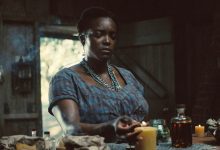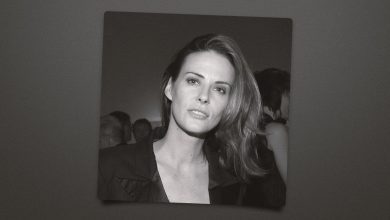‘Andor’ Creator Tony Gilroy Talks the Challenges of Following Up Season One’s Rapturous Acclaim
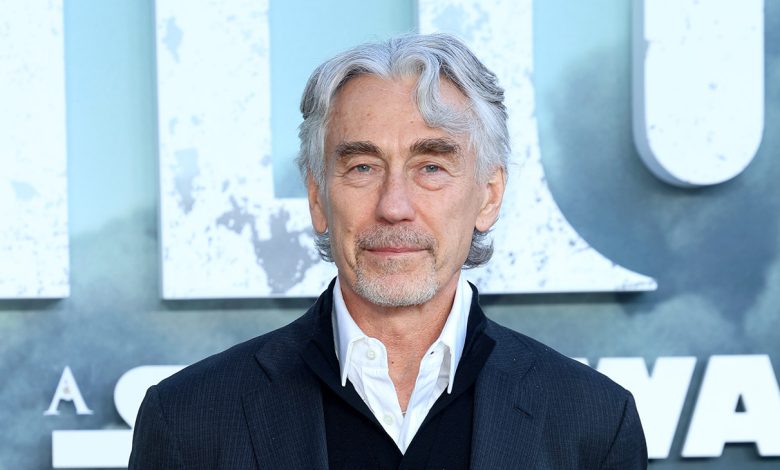
Andor showrunner Tony Gilroy had already written most of season two by the time season one became the most well-reviewed Star Wars title of the Disney era. The series about how small-time thief Cassian Andor (Diego Luna) became a Rebel hero in time for his ultimate sacrifice in 2016’s Rogue One was so well-received that one of the audience’s only quibbles actually pertained to the minimal number of alien characters. (Season two noticeably makes up for it.) But despite having the second 12-episode story planned out in detail, the road to the finish line became far more challenging than anybody ever expected.
For starters, in the months leading up to Andor’s series premiere in September 2022, Wall Street fell out of love with streaming, resulting in a major market correction that no longer valued subscriber growth projections. Consequently, Disney had to make some tough choices about Disney+ going forward. Its leadership began by pumping the brakes on the release schedule of their already-produced work, and they, understandably, opted to become even more judicious regarding its production output and overall spend.
اRelated Posts:
The market volatility at the time made Andor season two’s budget discussion more complicated, namely because the show was something of a late bloomer in terms of viewership ratings. Instead of surging to high marks right out of the gate, its strong word of mouth yielded long-tail growth. But the newly reappointed CEO Bob Iger, along with Lucasfilm president Kathleen Kennedy, still rolled the dice on their critical darling that later racked up eight Emmy nominations.
“Everything had changed. The sky was falling. Our attitude between [EP] Sanne [Wohlenberg], Diego [Luna], and I was like, ‘We’d be happy having season one just be the show. We’d rather not do it than do it lame.’ And we really meant it. We weren’t playing chicken or anything,” Gilroy tells The Hollywood Reporter in support of Andor season two’s three-episode premiere on April 22. “Everybody was in a terrible position. And man, the critics helped us. The weirdness of our numbers started to help us. They rise over time, and they must have had some comfort for Disney that I’m unaware of for them to gamble. Kathy [Kennedy] gambled and Iger gambled.”
A couple episodes had to be reconceived under the agreed-upon figure, but Andor season two was off and running until 2023’s WGA and SAG strikes presented their own unique obstacles for the filmmaking team. Gilroy completed his writing obligations six days before the WGA strike went into effect on May 2, 2023, ensuring that his directors and department heads had everything they needed to proceed without him. The SAG strike then followed in July, and so the production had to get creative upon continuation, especially with the rye field they grew in Central England for the agricultural-based planet of Mina-Rau.
Perhaps the labor stoppages’ most significant impact was on the music side of season two. Season one’s not-so-secret weapon was the score of composer Nicholas Britell, and by living a short distance away from each other in Manhattan, Gilroy visited Britell’s studio many times in order to collaborate ahead of production on both seasons. However, following the strikes, there was a scheduling logjam across the industry, and coupled with a personal loss, Britell had to reduce his involvement in season two. That opened the door for composer Brandon Roberts to not only expand on the many hours of themes that Britell had already established for season one, but also write some of his own memorable cues.
“I was in despair about [Britell’s exit] for quite a while. And then, as it started to happen [with Roberts], I was just like, ‘Oh my God, this is fantastic,’” Gilroy says. “So it really worked out, and hopefully, everybody’s really happy about it.”
Knowing that the series would end up on the doorstep of Rogue One: A Star Wars Story, Gilroy hoped to populate Yavin 4 Rebel Base with as many familiar faces as possible. But the realities of production meant that they had to forgo some actors and even recast.
“Legacy characters are really tricky to bring back. They’re very, very expensive. A lot of times, their schedules don’t work out,” Gilroy shares. “There’s probably a couple people that we wanted to have in Yavin at the end, who are in the beginning of Rogue, but we just couldn’t get them because they were busy.”
He also credits Disney and Lucasfilm for not pressuring him to insert the most storied Star Wars characters into the fold. “On the creative side, I will never have an experience like this ever again,” Gilroy adds. “It’s just amazing that they trusted us, and they backed our play all the way through.”
As he’s stated several times throughout the last couple years, Andor season two will be Gilroy’s swan song in the Star Wars franchise. When you consider his reconfiguration of Rogue One during post-production, he’s already given nearly a decade of his life to the galaxy far, far away. And across Andor‘s two seasons, he’s done a staggering amount of work the last five years, likening each block of three episodes to a feature film. (Both seasons have a combined total of eight blocks.) Looking ahead, he’s eager to get his Oscar Isaac-led cellist movie, Behemoth, up and running off the strength of Andor season two.
“We’ve [essentially] made eight movies in five years, man. Eight movies,” Gilroy stresses. “That’s what we really did, and that’s a lot. So, every now and then, you want Thai food for a change.”
Below, during a recent conversation with THR, Gilroy also discusses the expanded roles of Elizabeth Dulau’s Kleya and Muhannad Bhaier’s Wilmon in season two, as well as the unseen stories between each block of three episodes.
***
Sagrona!
Sagrona teema!
During our multiple season one interviews, you were already prepping to shoot season two with director Ariel Kleiman. Does that imply that you were able to write most of season two without viewer feedback seeping into the mix?
Yeah, but the writing never stops. We get close, and then we get a little bit closer. Everything then comes [back to me], and I just crawl through it. But we knew what we were going to do, and we’re very close to what we knew we were going to do. There were some budgetary issues that came up. There’s a couple of episodes that changed dramatically because of budgetary shifts, but yeah, we wrote [season two] in a vacuum. We built it in a vacuum before the response came in.
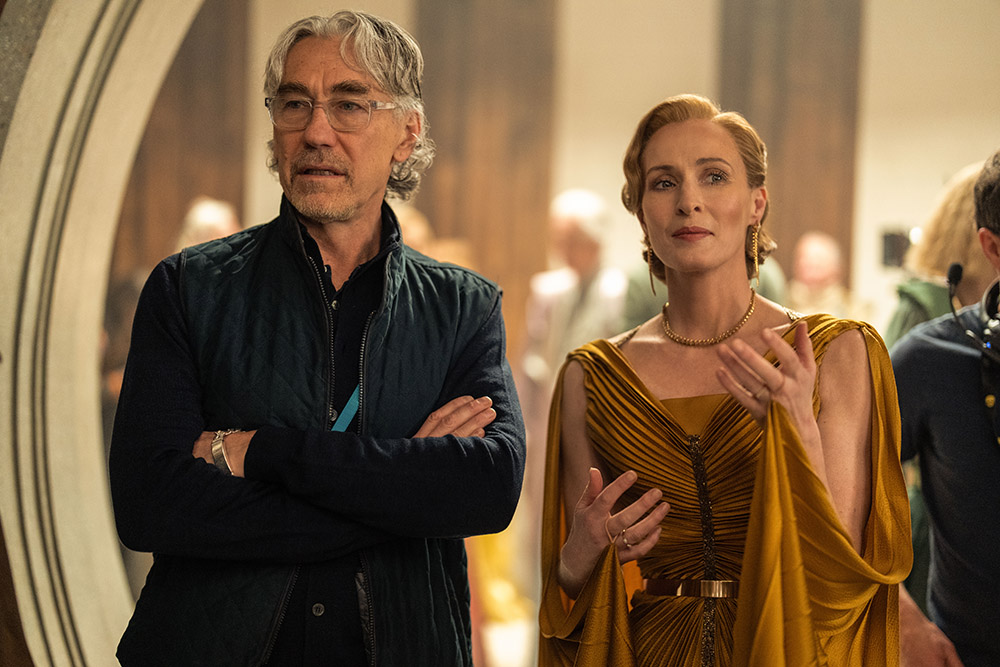
You had to make some Covid-related concessions in season one, many of which worked out for the best, such as thousands of Aldhani people (the Dhanis) being rewritten into a few “dead-enders.” In season two, you then had to contend with strike-related obstacles. Did you again have to make some adjustments on account of the labor stoppages?
All the compromises were done before, or not compromises, but all the problem-solving economics were done before that. It’s hard to get people to understand how we make the show. Every show has its own system. I watched [Wise Guy: David Chase and The Sopranos], and I was like, “Oh my God, that’s so alien to what we would do.” My system is to work with [producer designer-EP] Luke [Hull] and sketch the show, design the show and get an idea of what it is. For this season, we had the idea for these year-long gaps and all this negative space [between blocks of three episodes]. So I wrote the top and the tail of each block to prove that it could be done. I didn’t want to have anybody tell me it couldn’t be done.
Then we went into the [writers’] room to chew through the whole thing, using all the pieces that we have there, and we assigned the episodes. Those guys [Beau Willimon, Dan Gilroy, Tom Bissell] then went off and brought back drafts. They got close so we could budget and cast, but man, they’re expensive and they have other things to do. It then comes back to me, and I crawl. These are dead-on blueprints. Every single moment, every single thing, is perfect, and it’s been vetted by everybody. Everybody knows what they need to do, and we’ve had multiple meetings on it.
The directors then take those scripts and make their movie without anybody over their shoulder. I mean, I’d talk to the director every Sunday night about what they were going to do that week, and if there’s a problem, I’m available. But no writer is ever on set. We don’t do that. We let [the directors] swing away, and we tell them, “We don’t want coverage.” They know what our visual grammar is, but television directors are so restricted in so many ways, and you want them to have massive freedom when you can. So [Andor] was a chance to really give them that.
If you’d asked me in September [2022], “What’s going to be the biggest day of your year?” I would’ve said, “Around the Ides of March [2023]. I’m going to finish the final draft of the final [episode], and I won’t have to write anymore for the first time in five years. I won’t have to get up and do that. It’s going to be a very radical change.” And it ended up being six days before the [WGA] strike [that officially began on May 2, 2023]. So they had all the blueprints, we’d had all the meetings, and then I was out. But they had everything, and they were rocking it until the SAG strike [in July 2023]. We had 200 acres of rye up in the Midlands [of Central England] that was due to blossom around our [original] schedule for Mina-Rau, and they did incredible work to problem solve.
So that’s how we did it, and that was our system. The strike did not impact the show in any way other than freezing it in amber and forcing us to make some really daring problem-solving movie tricks when we reconvened.
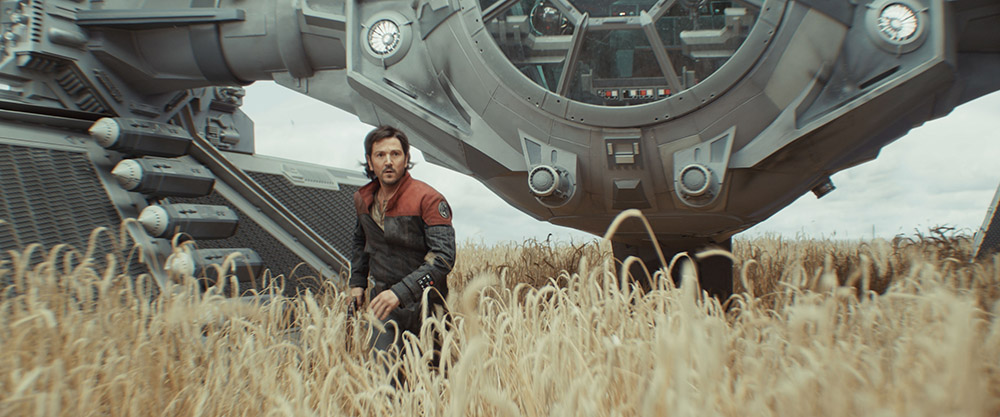
Streamers are much more prudent than they were when Andor was first greenlit. In the summer of 2022, right before your series premiere, there was a major market correction in regard to streaming, as you know.
Yes, I do!
Thus, once things took a turn, are you especially glad that you had reconfigured the show (from five seasons) into two seasons?
Yeah, you wouldn’t have a second season otherwise. We were asking for the same amount of money or more. The scale of the show had changed, but we asked for [at least] the same thing. Everything had changed. [Disney CEO Bob] Iger was back. People were getting laid off. The sky was falling.
Our attitude between [EP] Sanne [Wohlenberg], Diego [Luna], and I was like, “Well, we hear you, but we only have what we have. We’d be happy having season one just be the show. We’d rather not do it than do it lame.” And we really meant it. We weren’t playing chicken or anything. We were just telling the truth. But everybody was in a terrible position. And man, the critics helped us. The weirdness of our numbers started to help us. I don’t know what our numbers really are, but I’ve been told they’re eccentric and they go in the opposite direction of what people expected. They rise over time, and they must have had some comfort for Disney that I’m unaware of for them to gamble. Kathy [Kennedy] gambled and Iger gambled, but it would have been either/or. I don’t think there’s a skinny version of it that worked.
You mentioned that the release schedule was Disney’s call, and while it did raise an eyebrow at first, I, for what it’s worth, feel it was the right move after watching each block of episodes on consecutive nights. (Gilroy referred to each block as a movie earlier, and that’s exactly what the three-episode viewing experience felt like to me.) So have you come around on the release schedule at all?
Yeah, I mean, it’s a complicated question. We didn’t write this with the newspaper. We didn’t plan on timing with anything like that. The show is meant to be timeless and classical. I wish we’d come out in August or September, but everybody has been sitting on their hands for so long. There are so many actors in the show, and some of our amazing actors don’t have agents. So some people aren’t working, and they’ve been waiting for stuff to come out. I’ve been trying to get a movie [the Oscar Isaac-led Behemoth] off that’s been really hard to get off, and I think it’ll be a lot easier once the show comes out. I think it’ll give me a little bit more credibility. So it’s hard to wait.
As mentioned, there are one-year gaps between each block of episodes, and whenever the story resumes following the “negative space,” there are references to unseen stories. How deep did you dive into what those off-screen stories are?
In some cases, deeply. When you come back to Bix and Cassian the first time in the safe house, that story about the soldier had to be really worked out. You can’t leave the actors hanging like that; they’re really talking about something. If they’re talking about it and it’s on the plate for them, then they have to know what’s there to do their job. Sometimes, I’m kind of cavalier about it, sometimes not. But if you put a gun to my head, I could answer it all. I could do it all if I had to.
Were those unseen stories your way of offering parting gifts to Lucasfilm in case they want to develop that real estate someday?
I never thought of it that way. Look, you could do anything. You could do the Maya Pei Brigade [show]. You could do the Luthen and Saw show. You really could do anything. But I wanted to leave them with some hope at the very, very, very end. You saw what I’m doing there. But I never consciously thought about that while we were doing it. No one’s ever discussed that.
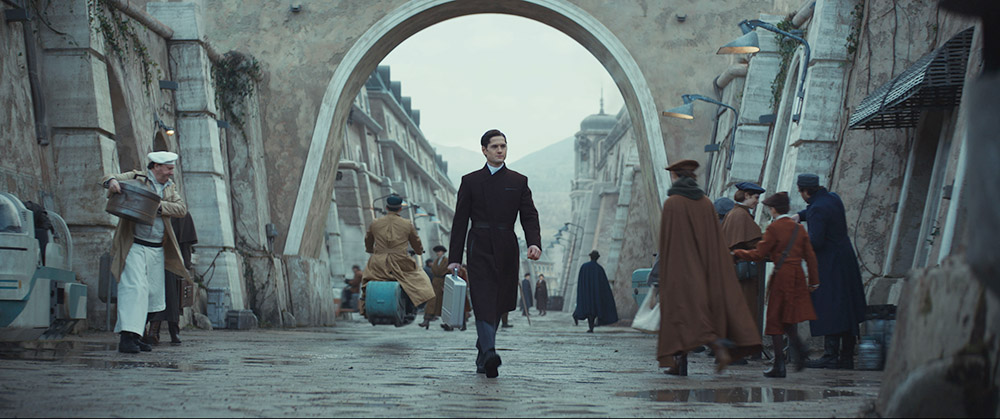
As has been established, the Ghorman Massacre is a central piece of this season. And knowing that you’re a history buff, what comps were you referencing the most during the writing and design of all things Ghorman?
Well, the lighting of the flame in the very first episode where Krennic calls the meeting, that’s the Wannsee Conference. It was a meeting outside of Berlin [in 1942], and they’ve made a few movies out of it. Frank Pierson made a really good movie called Conspiracy with Stanley Tucci and Kenneth Branagh. And the reason they could make the movie is because the Nazis kept their notes.
It was a three-hour luncheon where Nazi lawyers, Nazi engineers and 15 of your other favorite Nazis got together to design the mechanics of the “Final Solution.” “Oh, we can’t use trucks and carbon monoxide. We really need Zyklon gas. How much Zyklon gas do we need? How do we get it there? How should we truck these people? Who’s a Jew? Well, if your father’s a Jew ….” The lawyers then had to spend 15 minutes figuring out. It was all dispassionately done, like a PowerPoint meeting, and they’d eat their lunch and go back to work. So that’s the comp there.
The propaganda that’s used against the Ghormans, think of the Reichstag fire there. Think of “Remember the Maine,” when [William Randolph] Hearst brought us into the Spanish-American War. The Gulf of Tonkin brought us into Vietnam. You can go all through history to see how propaganda has been used to make public opinion turn against somebody. So there’s historical comps all over the place.
Elizabeth Dulau’s Kleya, who’s Luthen’s (Stellan Skarsgård) right hand, received the biggest promotion in season two, and she really makes the most of the opportunity. Did you see something in her during season one that warranted a major bump in screen time?
Yeah, she came in and blew us away all through the season. It was the first job she ever had. She was right out of RADA [Royal Academy of Dramatic Art]. In the beginning it was like, “Well, maybe she’s just the sorcerer’s apprentice. Let’s see what we’re going to do with this.” A lot of showrunners have talked about this over time, and it’s certainly not a fresh idea, but it’s so true that you just watch who can do what as you go. And we just lucked out.
Mo [Muhannad Bhaier], who plays Wilmon, I just threw him on the truck at the end [of season one] to get him out of there. He was very good in the first season, and I thought, “Well, they can’t leave that kid behind because they’ll definitely kill him. They knew he threw the bomb. So let’s put him on the truck on the way out.” And man, there’s another actor that rises.
But Elizabeth, by the time we finished season one, everyone on our whole show was just in awe. We don’t have a moment of bad film on her, and it was just so exciting what we could do with her. So, yeah, why would you not want to play that instrument?
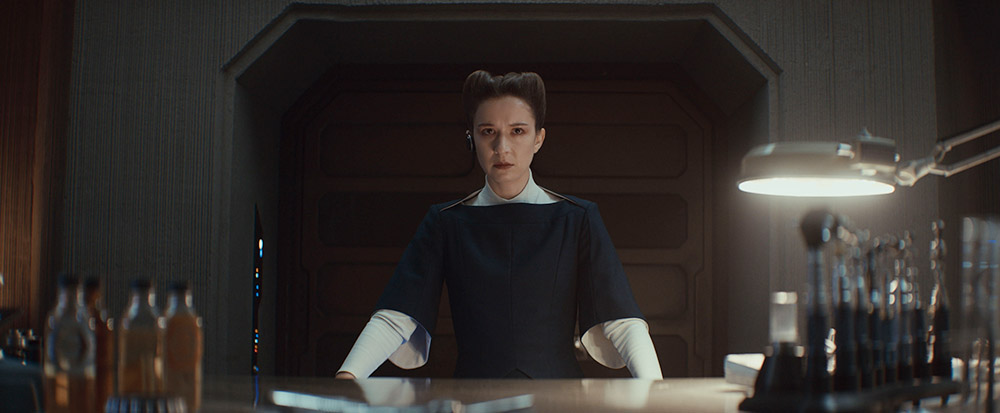
The score remains a highlight, especially a certain cue involving Bix near a window. That said, it appears that composer Nicholas Britell took a step back this season. Was he tied up with other commitments?
We got really hung up because of the strikes, and when we came back, there was a huge traffic jam on everybody’s plate. So he had a lot of obligations, and then he had a personal crisis. His father had passed away, and it all happened simultaneously. So we just couldn’t wait and not do anything. We already had 11 hours of music and themes that we worked on together in season one, and a big part of the job anyway was going to be reinterpreting some of the things that we’d already done. So we really lucked out in meeting Brandon [Roberts]; he was just the perfect Swiss-Army-knife composer. It was both a similar process and a very different one with a very different vibe, but it worked out. I was in despair about it for quite a while. And then, as it started to happen, I was just like, “Oh my God, this is fantastic.” So it really worked out, and hopefully, everybody’s really happy about it. I think so.
I appreciate that there’s no egregious fan service. You included only the characters who absolutely needed to be there. The powers that be never said, “Can you get so-and-so in there?” You were left to your own devices?
Yeah, totally. I’m not kidding. On the creative side, I will never have an experience like this ever again. At one point, this came up, and people said, “Well, Disney is going to be upset that you ….” But it’s just amazing that they trusted us, and they backed our play all the way through. I know we kept delivering. Our dailies were always in, and we always made our mark. We did everything we said we were going to do, and the scenes were good. I know they were watching.
If anything, legacy characters are really tricky to bring back. They’re very, very expensive. A lot of times, their schedules don’t work out. There’s probably a couple people that we wanted to have in Yavin at the end, who are in the beginning of Rogue, but we just couldn’t get them because they were busy.
Are the aforementioned reasons why you had to recast a legacy character?
Yeah.
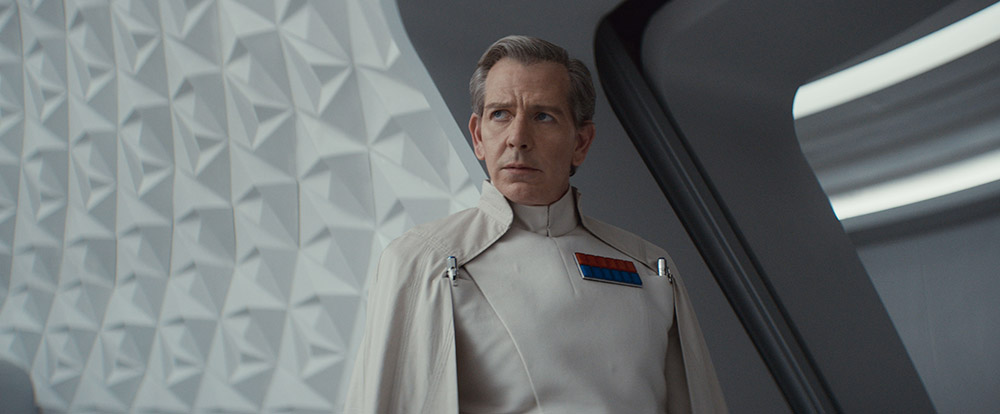
In Rogue One, while briefly imprisoned by Saw Gerrera (Forest Whitaker), Cassian says, “This is a first for me.” It was in response to Donnie Yen’s character saying, “Relax, Captain. We’ve been in worse cages than this one.” Of course, the Narkina 5 story in season one was well worth sidestepping continuity, but how did you rationalize this line internally?
My retcon on that is that he doesn’t want them to know too much about him. He’s just messing with them. Why tell them? He’s a spy.
I was glad to read your appreciation for fellow Star Wars creators Jon Favreau and Dave Filoni recently. I, too, have seen that bizarre online narrative that pits you guys against one another, and the exact same thing happened to J.J. Abrams and Rian Johnson.
Really?
To a T.
I wasn’t following that, but wow.
I recognize that some people want their preferred version of Star Wars so much that they’ll jockey for position in any way they can, but shouldn’t we all be rooting for a rising tide in that case? Success means we can all win and get what we want.
Yeah, it doesn’t make any sense to me. If you love this thing, then the more variety in it, [the better]. You can’t talk about the Star Wars community; it’s not a monolithic thing at all. There’s 25 different versions in there. But I do go online, particularly when we’re going out to sell or there’s something intense or we’re getting into marketing and we’re trying to figure out what to do. So I do go online and look, and most of it is fantastic. But every now and then, there’s just someone saying something that’s completely appalling. The people who speak with the most authority online are usually the people who know the least. That seems to be a pretty fair theorem. So I don’t want to piss anybody off by saying this, but it is a big tent, man. It’s a big frickin’ tent. It should be.
That’s why I appreciate what Lucasfilm has been doing on Disney+. They’ve been experimenting with all sorts of tones, genres and flavors.
Yep, I’m into it. You can’t do irony in print. At some point, I said, “Oh, you can do a three-camera show.” And I was just riffing, but oh my God, people were like, “What the fuck is he talking about?” So I try to have a sense of humor about it.
I’ve had two-and-a-half years to come to terms with Andor season two likely being your last hurrah with Star Wars. That said, James Cameron was once asked why he wants to spend the rest of his life making Avatar movies, and his response was that he can tell virtually any story he wants in that world. Theoretically, could you also tell any story you want in the Star Wars galaxy?
No. I mean, if you wanted to do Serpico or Midnight Cowboy, I suppose you could, but it might not be the most comfy fit. Could you do Michael Clayton in Star Wars? I don’t know. But you can do an incredible number of things, though. So I understand the attraction, and he’s absolutely right. It’s a great hideout for anything you want to do, and I’ve found that out. But we’ve [essentially] made eight movies in five years, man. Eight movies [i.e., eight blocks of three episodes]. That’s what we really did, and that’s a lot. So, every now and then, you want Thai food for a change.
Lastly, you told me to re-raise this question and coordinating conjunction joke come season two, so here goes: If the name Andor exists in the Star Wars galaxy, does that mean the name Butyet also exists?
(Laughs.) I should have done it. I should have put a “Butyet” in there. It’s a good Star Wars name.
***
Andor season two’s three-episode premiere streams April 22 on Disney+.
Source: Hollywoodreporter
HiCelebNews online magazine publishes interesting content every day in the TV section of the entertainment category. Follow us to read the latest news.
Related Posts
- A Look Back on Film’s ‘Intentional’ Fashion Moments
- Janice From ‘Friends’ Believes Matthew Perry Visited Her as a Hawk
- ‘The Amateur’ Team on That “Challenging” Pool Collapse Scene and Transformative Ending
- Brian Austin Green Undergoes Surgery for Perforated Appendix, Says He’s ‘on the Road to Recovery’
- Unraveling Love: Netflix’s ‘Four Seasons’ Trailer Exposes the Tensions in Modern Marriages




